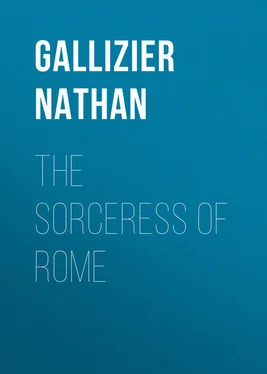Nathan Gallizier - The Sorceress of Rome
Здесь есть возможность читать онлайн «Nathan Gallizier - The Sorceress of Rome» — ознакомительный отрывок электронной книги совершенно бесплатно, а после прочтения отрывка купить полную версию. В некоторых случаях можно слушать аудио, скачать через торрент в формате fb2 и присутствует краткое содержание. Жанр: foreign_antique, foreign_prose, на английском языке. Описание произведения, (предисловие) а так же отзывы посетителей доступны на портале библиотеки ЛибКат.
- Название:The Sorceress of Rome
- Автор:
- Жанр:
- Год:неизвестен
- ISBN:нет данных
- Рейтинг книги:4 / 5. Голосов: 1
-
Избранное:Добавить в избранное
- Отзывы:
-
Ваша оценка:
- 80
- 1
- 2
- 3
- 4
- 5
The Sorceress of Rome: краткое содержание, описание и аннотация
Предлагаем к чтению аннотацию, описание, краткое содержание или предисловие (зависит от того, что написал сам автор книги «The Sorceress of Rome»). Если вы не нашли необходимую информацию о книге — напишите в комментариях, мы постараемся отыскать её.
The Sorceress of Rome — читать онлайн ознакомительный отрывок
Ниже представлен текст книги, разбитый по страницам. Система сохранения места последней прочитанной страницы, позволяет с удобством читать онлайн бесплатно книгу «The Sorceress of Rome», без необходимости каждый раз заново искать на чём Вы остановились. Поставьте закладку, и сможете в любой момент перейти на страницу, на которой закончили чтение.
Интервал:
Закладка:
There was a brief silence.
"'Tis three years since last we strode these walks," Eckhardt spoke again. "What changes time has wrought!"
"Have the dead brought you too back to Rome?" queried Benilo with averted gaze.
"Even so," Eckhardt replied, as he strode by Benilo's side. "The dead! Soon I too shall exchange the garb of the world for that of the cloister."
The Chamberlain stared aghast at his companion.
"You are not serious?" he stammered, with well-feigned surprise.
Eckhardt nodded.
"The past is known to you!" he replied with a heavy sigh. "Since she has gone from me to the dark beyond, I have striven for peace and oblivion in every form, – in the turmoil of battle, before the shrines of the Saints. – In vain! I have striven to tame this wild passion for one dead and in her grave. But this love cannot be strangled as a lion is strangled, and the skill of the mightiest athlete avails nothing in such a struggle. The point of the arrow has remained in the wound. Madness, to wander for ever about a grave, to think eternally, fatefully of one who cannot see you, cannot hear you, one who has left earth in all the beauty and splendour of youth."
A pause ensued, during which neither spoke.
They walked for some time in silence among the gigantic ruins of the Palatine. Like an alabaster lamp the moon hung in the luminous vault of heaven. How peacefully fair beneath the star-sprinkled violet sky was this deserted region, bordered afar by tall, spectral cypress-trees whose dark outlines were clearly defined against the mellow luminance of the ether. At last Eckhardt and his companion seated themselves on the ruins of a shattered portico, which had once formed the entrance to a temple of Saturnus.
Each seemed to be occupied with his own thoughts, when Eckhardt raised his head and gazed inquiringly at his companion, who had likewise assumed a listening attitude. Through the limpid air of the autumnal night, like faint echoes from dream-land, there came softly vibrating harp-tones, mingled with the clash of tinkling cymbals, borne aloft from distant groves. Faint ringing chimes, as of silver bells, succeeded these broken harmonies, followed by another clash of cymbals, stormily persistent, then dying away on the evanescent breezes.
A strange, stifling sensation oppressed Eckhardt's heart, as he listened to these bells. They seemed to remind him of things which had long passed out of his life, the peaceful village-chimes in his far-away Saxon land, the brief dream of the happy days now for ever gone. But hark! had he not heard these sounds before? Had they not caressed his ears on the night, when accompanying the king from Aix-la-Chapelle to Merséburg, they passed the fateful Hoerselberg in Thuringia?
Eckhardt made the sign of the cross, but the question rising to his lips was anticipated by Benilo, who pointed towards a remote region of the Aventine, just as the peals of the chiming bells, softened by distance into indistinct tremulous harmonies, and the clarion clearness of the cymbals again smote the stillness with their strangely luring clangour.
"Yonder lies the palace of Theodora," Benilo remarked indifferently.
Eckhardt listened with a strange sensation.
He remembered the pageant he had witnessed in the Navona, the pageant, from whose more minute contemplation he had been drawn by the incident with Gian Vitelozzo.
"Who is the woman?" he questioned with some show of interest.
"Regarding that matter there is considerable speculation," replied Benilo.
"Have you any theory of your own?"
The Chamberlain shrugged his shoulders.
"Heard you ever of a remote descendant of Marozia, still living in Italy?"
"I thought they had all been strangled long ago."
"But if there were one, deem you, that the harlot-blood which flowed in the veins of her mother and all the women of her house would be sanctified by time, a damp convent-cell, and a rosary?"
"I know nothing of a surviving limb of that lightning-blasted trunk."
"Did not the direct line of Marozia end with John XI, whom she succeeded in placing in the chair of St. Peter, ere she herself was banished to a convent, where she died?" questioned Benilo.
"So it is reported! And this woman's name is?"
"Theodora!"
"You know her?"
Benilo met Eckhardt's gaze unflinchingly.
"I have visited her circle," he replied indifferently.
Eckhardt nodded. He understood.
Dexterously changing the subject Benilo continued after a pause.
"If you had but some heart-felt passion, to relieve your melancholy; if you could but love somebody or something," he spoke sympathetically. "Truly, it was never destined for the glorious career of Eckhardt to end behind the bleak walls of a cloister."
Eckhardt bowed his head.
"Philosophy is useless. Strange ailments require strange cures."
For some time they gazed in silence into the moonlit night. Around them towered colossal relics of ancient grandeur, shattered walls, naked porticoes. Wildernesses of broken arches stretched interminably into the bluish haze, amidst woods and wild vegetation, which had arisen as if to reassert their ancient possessions of the deserted site.
At last Eckhardt spoke, hesitatingly at first, as one testing his ground, gradually with firmer purpose, which seemed to go straight to the heart of his companion.
"There is much about Ginevra's sudden death that puzzles me, a mystery which I have in vain endeavoured to fathom. The facts are known to you, I can pass them over, dark as everything seems to me at this very moment. So quickly, so mysteriously did she pass out of my life, that I could not, would not trust the testimony of my senses. I left the house on the Caelian hill on that fateful night, and though I felt as if my eyes were bursting from my head, they did not shed a single tear. Where I went, or what I did, I could not tell. I walked about, as one benumbed, dazed, as it sometimes happens, when the cleaving stroke of an iron mace falls upon one's helmet, deafening and blinding. This I remember – I passed the bridge near the tower of Nona and, ascending the Borgo, made for the gate of San Sebastian. The monks of Della Regola soon appeared, walking two by two, accompanied by a train of acolytes, chanting the Miserere, and bearing the coffin covered with a large pall of black velvet."
Eckhardt paused, drawing a deep breath. Then he continued, slowly:
"All this did not rouse me from the lethargy which had benumbed my senses. Only the one thought possessed me: Since we had been severed in life, in death at least we could be united. We were both journeying to the same far-off land, and the same tomb would give us repose together. I followed the monks with a triumphant but gloomy joy, feeling myself already transported beyond the barriers of life. Ponte Sisto and Trastevere passed, we entered San Pancrazio."
There was another pause, Benilo listening intently.
"The body placed in the chapel, prior to the performance of the last rites," Eckhardt continued, "I hurried away from the place and wandered all night round the streets like a madman, ready to seek my own destruction. But the hand of Providence withheld me from the crime. I cannot describe what I suffered; the agony, the despair, that wrung my inmost heart. I could no longer support a life that seemed blighted with the curse of heaven, and I formed the wildest plans, the maddest resolutions in my whirling brain. For a strange, terrible thought had suddenly come over me. I could not believe that Ginevra was dead. And the longer I pondered, the greater became my anxiety and fear. Late in the night I returned to the chapel. I knelt in the shadow of the vaulted arches, leaning against the wall, while the monks chanted the Requiem. I heard the 'Requiescat in Pace,' I saw them leave the chapel, but I remained alone in the darkness, for there was no lamp save the lamp of the Virgin. At this moment a bell tolled. The sacristan who was making the rounds through the church, preparatory to closing, passed by me. He saw me, without recognizing who I was, and said: 'I close the doors.' 'I shall remain,' I answered. He regarded me fixedly, then said: 'You are bold! I will leave the door ajar – stay, if you will!' And without speaking another word he was out. I paid little heed to him, though his words had strangely stirred me. What did he mean? After a few moments my reasoning subsided, but my determination grew with my fear. Everything being still as the grave, I approached the coffin, cold sweat upon my brow. Removing the pall which covered it, I drew my dagger which was strong and sharp, intending to force open the lid, when suddenly I felt a stinging, benumbing pain on my head, as from the blow of a cudgel. How long I lay unconscious, I know not. When after some days I woke from the swoon, the monks had raised a heavy stone over Ginevra's grave, during the night of my delirium. I left Rome, as I thought, for ever. But strange misgivings began to haunt my sleep and my waking hours. Why had they not permitted me to see once more the face I had so dearly loved, ere they fastened down for ever the lid of the coffin? 'Tis true, they contended that the ravages of the fever to which she had succumbed had precipitated the decomposition of her body. Still – the more I ponder over her death, the more restless grows my soul. Thus I returned to Rome, even against my own wish and will. I will not tarry long. Perchance some light may beam on the mystery which has terrified my dreams, from a source, least expected, though so far I have in vain sought for the monk who conducted the last rites, and whose eyes saw what was denied to mine."
Читать дальшеИнтервал:
Закладка:
Похожие книги на «The Sorceress of Rome»
Представляем Вашему вниманию похожие книги на «The Sorceress of Rome» списком для выбора. Мы отобрали схожую по названию и смыслу литературу в надежде предоставить читателям больше вариантов отыскать новые, интересные, ещё непрочитанные произведения.
Обсуждение, отзывы о книге «The Sorceress of Rome» и просто собственные мнения читателей. Оставьте ваши комментарии, напишите, что Вы думаете о произведении, его смысле или главных героях. Укажите что конкретно понравилось, а что нет, и почему Вы так считаете.












